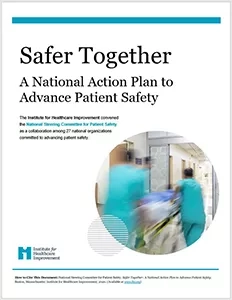National Action Plan to Advance Patient Safety
National Action Plan to Advance Patient Safety
A Total Systems Approach to Safety
Despite substantial effort over the past 20 years, preventable harm in health care remains a major concern in the United States. Though many evidence-based, effective best practices related to harm reduction have been identified, they are seldom shared nationally and implemented effectively across multiple organizations.
Reducing preventable harm requires a concerted, persistent, coordinated effort by all stakeholders, and a total systems approach to safety. Total systems safety requires coordination at many levels, which in turn necessitates robust collaboration among all stakeholders.
By harnessing the knowledge and insights of influential federal agencies, leading health care organizations, patient and family advocates, and respected industry experts into a set of actionable and effective recommendations, Safer Together: A National Action Plan to Advance Patient Safety (NAP) provides clear direction for making significant advances toward safer care and reduced harm across the continuum of care.
By planning and investing together, mobilizing resources together, learning together, and sharing lessons learned, we can drive meaningful change and advance the goal of creating the safest health care for patients and those who care for them.
Safer Together: A National Action Plan to Advance Patient Safety

Safer Together: A National Action Plan to Advance Patient Safety provides clear direction and 17 recommendations that health care leaders, delivery organizations, and associations can use to make significant advances toward safer care and reduced harm across the continuum of care.
The report harnesses the knowledge and insights of the National Steering Committee for Patient Safety (NSC) members, including influential federal agencies, leading health care organizations, patient and family advisors, and respected industry experts, into a set of actionable and effective recommendations to advance patient safety.
The National Action Plan centers on four foundational and interdependent areas, prioritized as essential to create total systems safety:
- Culture, Leadership, and Governance
- Patient and Family Caregiver Engagement
- Workforce Safety and Well-Being
- Learning System
The recommendations in these four areas build on the substantial body of experience, evidence, and lessons learned that the NSC has gathered and will test and implement together to allow for future refinements as our understanding, experience, and evidence evolve over time.
Self-Assessment Tool
The Self-Assessment Tool, a supplemental resource to the National Action Plan, assists leaders and organizations in identifying where to begin their patient and workforce safety improvement journey. The assessment was updated in 2024 to incorporate the latest insights and best practices from global safety initiatives. The tool is available as both a downloadable PDF document and in an online format — learn more and get started with your online assessment.
Self-Assessment Tool User Guide
The Self-Assessment Tool User Guide offers more detailed insights, interpretations, and guidance for completing the National Action Plan Self-Assessment Tool.
Implementation Resource Guide
The Implementation Resource Guide, a supplemental resource to the National Action Plan, details specific tactics and supporting resources for implementing the National Action Plan recommendations.
Declaration to Advance Patient Safety
In May 2022, the NSC issued the Declaration to Advance Patient Safety to urge health care leaders across the care continuum to recommit to advancing patient and workforce safety with a total systems approach, as presented in the National Action Plan.
Additional Support
IHI Safer Together Recognition Program
Celebrate your organization's commitment to advancing quality and safety. The IHI Safer Together Recognition Program acknowledges the achievements of hospitals that have made significant strides to improve patient and workforce safety by implementing proactive changes in systems and processes.
Learn More




